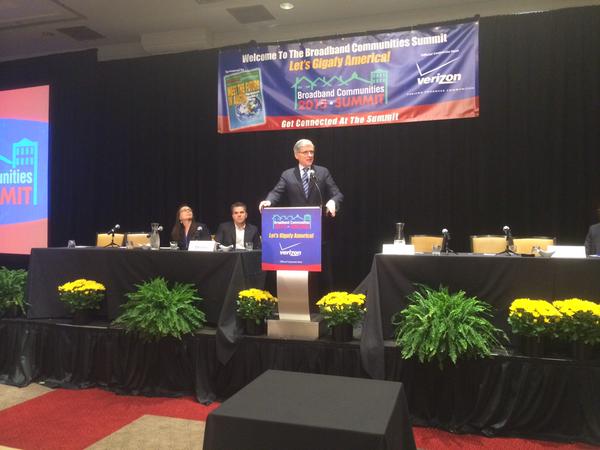FCC Chairman Tom Wheeler Pokes Finger in Eye of Telecom Incumbents at Broadband Communities in Austin
AUSTIN, April 14, 2015 – The Chairman of the Federal Communications Commission came to Broadband Communities Summit here to metaphorically poke his finger in the eye of the biggest incumbent communications companies. He cited this city as Exhibit A for his mantra of “competition, competition, compe
He cited this city as Exhibit A for his mantra of “competition, competition, competition.”
And one day after the first of multiple legal challenges to the agency’s network neutrality rules, Wheeler delivered a full-throated defense of those regulations.
Wheeler also offered — to repeated applause from the crowd — a vigorous defense of municipalities’ and communities’ right to offer broadband internet services.
Speaking of the reason for gathering in Austin, Wheeler said: “I know it’s not an accident that you’re meeting in Austin, the city that proves competition works. Back in 2013, Google Fiber announced it was coming to town. Not to be outdone, AT&T initiated upgrades to its network, so it can offer gigabit service for $70/month. As if most of you weren’t jealous already, a regional carrier, Grande upgraded its network and is offering Gigabit broadband in Austin for $65 a month.”
Wheeler continued: “You see a similar competitive response across the country. Google Fiber has designated Atlanta as one of the next markets it will enter. Just weeks ago, Comcast announced plans to offer two-gigabits-per-second broadband in Atlanta, leapfrogging Google’s speeds even though the competition is only hypothetical at this point.”
He also defended the agency’s decision, on February 26, to preempt restrictions in Tennessee and North Carolina. That order, taken by a 3-2 vote of the FCC, came the same day as the even-more-controversial 3-2 decision mandating a new public utility regulatory framework governing net neutrality.
Laying out the big-picture importance of broadband, Wheeler said that ultra-high-speed broadband networks are the “indispensable infrastructure of our 21st century economy and democracy,” and that such capacity has “revolutionized the way businesses operate and people community.”
As regards public policy, Wheeler described “three simple keys to the broadband future: Broadband networks must be fast. Broadband networks must be fair. Broadband networks must be open.”
He segued into a discussion of the FCC’s decision to use Title II of the Communications Act, describing it as a “light-touch regulatory approach” which he said was modeled after the framework put in place for the mobile wireless industry.He said that his regulations on the cable, telco and wireless communications providers had been defended by tech giants including Google and eBay, and by startups Etsy and Vimeo. They’ve “praised the rules, saying strong net neutrality protections will preserve the internet as an open platform for innovation and free expression.”
On the subject of broadband expansion by communities, either by municipalities directly or by public-private partnerships, Wheeler was speaking to a strongly supportive crowd.
He said that many Americans are going from one choice to none at all. “In 2015, just under 75 percent of U.S. homes can chose from only one or fewer wired providers. And, of course, that ‘or fewer’ reference means that about 20 percent have NO access at that speed. That reality is simply unacceptable. Where there is no choice, the market cannot work.”
And that’s one key reason why the agency should be supportive of all measures to build better broadband, including fiber and Gigabit Networks by cities.
“No matter what the commission does to remove barriers to broadband investment, there will be communities that are underserved, or even unserved, by the private market,” he said. But “when commercial providers don’t step up to serve a community’s needs, we should embrace the great American tradition of citizens stepping up to take action collectively.”In the specific cases of Chattanooga, Tennessee, and Wilson, North Carolina, where the agency acted to override state restrictions on municipally-owned broadband providers, Wheeler said: “In Chattanooga, large companies like Amazon and Volkswagen have invested in new facilities, citing the city’s world-leading network as a reason why. And Chattanooga is emerging as an incubator for tech start-ups. In Wilson, the area’s top employers all rely on the community broadband network, new companies have located in Wilson because of its network, and residents and businesses in five surrounding counties are all pleading for access to this Gigabit-speed connectivity.”Nearing the conclusion of his remarks, he said:
My position on this matter was shaped by a few irrefutable broadband truths:
It is also important to recognize that the Commission’s recent ruling is responding to two specific petitions from two cities. It is enforceable only in those two states.
Having said that, this issue extends beyond these two states. I hope it highlights and discourages the efforts of incumbents to block consumer choice and competition.
And, as examples of positive trends in supporting community broadband networks, he cited efforts in the state of Connecticut; Bozeman, Montana; and Grand Junction, Colorado. In Grand Junction, “residents voted overwhelmingly last week to approve the city’s right to provide Internet access and local leaders are now exploring plans for a new community broadband network.”
Wheeler’s remarks were the first remarks by an agency chairman in the recent history of the Broadband Communities Conference, an annual gathering of fiber-optic enthusiasts, public policy officials, and the operators of broadband in multiple-dwelling units.
Wheeler opened his remarks by lauding Broadband Communities CEO Scott DeGarmo and his team “for hosting this conference and to all of you who work to spread the gospel about the importance of high-speed connectivity.”









